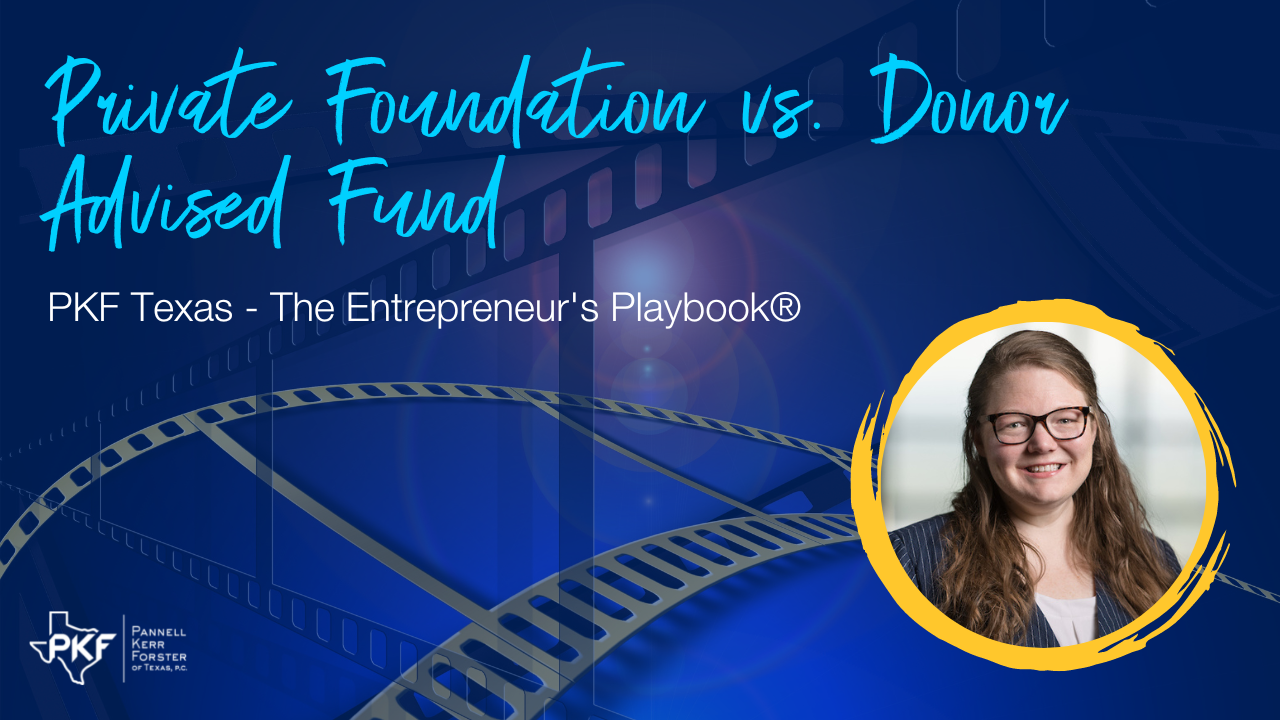Private Foundation vs. Donor Advised Fund

Which is better: setting up a private foundation or a donor advised fund? Each comes with pros and cons, dependent on your needs. In this episode of PKF Texas – The Entrepreneur’s Playbook®, Tax Director, Emily Smikal, CPA, distinguishes the difference between the two options.
Jen: This is the PKF Texas – Entrepreneur’s Playbook®. I’m Jen Lemanski, and I’m back again with Emily Smikal, a Tax Director and one of our Approachable Advisors™ here at PKF Texas. Emily, welcome back to the Playbook.
Emily: Thanks for having me.
Jen: Now, I know you work with a lot of high-net-worth individuals and family offices, and I’m sure there are a number of options for them to distribute their wealth via philanthropy. What can they look for?
Emily: Sure. Well, aside from just donating directly to charities, two of the most popular planning models around charitable giving are private foundations and donor advised funds.
The Difference
Jen: And so, what are then the differences between the two?
Emily: Well, private foundation is its own separate legal entity. It’s a 501(c)(3) organization, and it’s responsible for its own setup, its own tax filings, et cetera. A donor advised fund is simply an account set up with a 501(c)(3) organization that then acts as a sponsor.
Jen: So, with those two different options, how should a family decide which one is best for them?
Emily: So, the two main things to consider is:
- how much freedom and control does the family want over the donations?
- how much administrative burden and cost does the family want to endure?
So, a donor advised fund certainly leads more to the ease of administrative burden on the family because it’s set up with another organization. That organization handles the administration, the tax filing, et cetera. But just as the name suggests, the donor simply becomes an advisor to how the funds are distributed. So, while the donor can make suggestions on where they want the donations to go, the sponsoring organization does have to approve it. And also, donations from a donor advised fund can only go to a 501(c)(3) organization.
On the other hand, a private foundation, because it’s its own separate legal entity, certainly is more administrative burden and costs on the family. But it does give control to the family and the board. The board has full control over where the donations go, including they can donate to individuals and hardships; it doesn’t just have to be to 501(c)(3) organizations. So, with that extra burden does come more control.
How We Can Help
Jen: So, is there a route that you tend to advise our clients on, or is it just really what’s best for them?
Emily: It’s certainly what’s best for the family. We’d love to talk to the family, understand what their goals are for their family, for their philanthropic mindset and go from there.
Jen: Perfect. Well, we’ll get you to talk a little bit more about some more not-for-profit topic soon. Sound good?
Emily: Sounds great. Thank you.
Jen: This has been another thought leadership production brought to you by PKF Texas – The Entrepreneur’s Playbook®. For more information about this and other topics, visit www.pkftexas.com/NotForProfit. Tune in next week for another chapter.

